#Recycled Cotton Yarn
Explore tagged Tumblr posts
Text
"Good for the planet, good for your projects: Recycled Cotton Yarn."
#best polyester yarn companies in india#cotton fiber yarn#recycled cotton yarn#cotton weaving yarn#cheapest place to buy yarn#buy sustainable yarn online in india#fiber weaving products#weaving yarn#buy weaving yarn online in india#best quality dyed yarns#recycledcottonyarn#knitting#sustainability#ecofriendly#diy
17 notes
·
View notes
Text
Top Sustainable Cotton Yarn Suppliers You Should Know
The global demand for sustainable cotton yarn has skyrocketed as industries and consumers prioritize eco-friendly practices. To help businesses navigate the market, we present a comprehensive list of the top sustainable cotton yarn suppliers. These companies not only excel in producing high-quality yarn but also uphold stringent environmental and ethical standards.
1. Introduction to Sustainable Cotton Yarn
Sustainable cotton yarn is produced with methods that minimize environmental impact while ensuring ethical practices throughout the supply chain. Key attributes include organic farming, reduced water usage, energy-efficient manufacturing, and fair labor practices.
2. Leading Sustainable Cotton Yarn Suppliers
2.1. Lenzing Group
Location: Austria
Specialization: Known for their TENCEL™ Lyocell fibers, Lenzing Group integrates sustainable practices in producing cotton blends.
Sustainability Practices:
Certified by FSC® and PEFC™ for raw material sourcing.
Uses closed-loop manufacturing to reduce water and energy waste.
Implements zero deforestation policies.
2.2. Textile Exchange Certified Producers
Global Reach: Lists certified suppliers worldwide.
Specialization: Focuses on organic and recycled cotton yarn.
Sustainability Practices:
GOTS and OCS certifications.
Transparency in traceability from farm to final product.
2.3. PT Evergreen Mill
Location: Indonesia
Specialization: Recycled and organic cotton yarn for apparel and home textiles.
Sustainability Practices:
Uses advanced recycling technologies.
Zero-waste production policies.
Partners with local farming communities.
2.4. Bossa
Location: Turkey
Specialization: Organic and recycled cotton yarn for denim and fashion textiles.
Sustainability Practices:
Reduced water usage in dyeing processes.
Adherence to ZDHC guidelines.
Comprehensive carbon footprint reduction strategies.
2.5. Arvind Limited
Location: India
Specialization: A global leader in organic and Better Cotton Initiative (BCI) yarns.
Sustainability Practices:
Investments in renewable energy.
Water conservation projects through innovative technologies.
Collaboration with farmers for sustainable cotton farming.
3. Key Certifications to Look For
When selecting a sustainable cotton yarn supplier, certifications play a crucial role in ensuring authenticity.
3.1. Global Organic Textile Standard (GOTS)
Ensures the organic status of textiles from harvesting to labeling.
Verifies environmental and social compliance.
3.2. Organic Content Standard (OCS)
Focuses on verifying the organic material content in a product.
Encourages transparency in the supply chain.
3.3. Better Cotton Initiative (BCI)
Aims to make cotton production more sustainable by reducing environmental impact.
Promotes fair working conditions for farmers.
4. Advantages of Choosing Sustainable Cotton Yarn
4.1. Environmental Benefits
Reduced carbon emissions.
Minimized pesticide and chemical usage.
Lower water consumption compared to conventional cotton production.
4.2. Economic and Social Impact
Supports ethical labor practices.
Strengthens local economies through fair trade.
Enhances brand reputation and consumer trust.
5. How to Select the Right Supplier
When choosing a supplier, consider the following:
Certification: Verify GOTS, OCS, or BCI certifications.
Sustainability Practices: Evaluate the supplier’s environmental initiatives.
Product Range: Ensure the supplier offers the specific types of yarn you require.
Customer Reviews: Research feedback and testimonials.
Geographic Proximity: Consider the supplier’s location to minimize transportation impact.
Recycled Cotton Yarn
6. Conclusion
The shift towards sustainability in the textile industry has made it crucial for businesses to partner with responsible suppliers. By choosing from these top sustainable cotton yarn suppliers, you not only access high-quality materials but also contribute to a greener future. Prioritize certifications, transparency, and ethical practices to align with the growing demand for sustainable products.
1 note
·
View note
Text
Why Eco-Friendly Recycled Cotton Yarn is the Future of Sustainable Fashion
The global fashion industry is undergoing a paradigm shift as consumers and producers alike seek sustainable alternatives to traditional practices. One material at the forefront of this revolution is eco-friendly recycled cotton yarn.

This innovative material not only reduces environmental impact but also offers a viable path forward for ethical and sustainable fashion. Here, we delve into the myriad benefits, production processes, and applications of recycled cotton yarn, highlighting its pivotal role in the future of fashion.
The Environmental Imperative: Why Recycled Cotton Yarn Matters
The environmental toll of conventional cotton production is staggering. From excessive water consumption to harmful pesticide use, the need for sustainable alternatives has never been more urgent. Recycled cotton yarn addresses these challenges by:
Reducing Waste: Transforming post-consumer and post-industrial cotton waste into valuable yarn minimizes landfill contributions.
Lowering Resource Usage: Eliminating the need for virgin cotton reduces water and energy consumption dramatically.
Decreasing Carbon Footprint: The production process for recycled cotton emits significantly less CO₂ compared to traditional cotton.
Key Statistics
Water Savings: Producing 1 kg of recycled cotton saves up to 20,000 liters of water compared to virgin cotton.
Waste Reduction: Diverts millions of tons of textile waste from landfills annually.
Energy Efficiency: Requires 60% less energy than producing new cotton fibers.
How Recycled Cotton Yarn is Produced
The production of recycled cotton yarn involves a meticulous process designed to maximize fiber quality and sustainability:
Collection and Sorting Textile waste is collected from factories, retailers, and consumers. The materials are sorted by color and composition, reducing the need for dyeing.
Shredding and Fiber Recovery The sorted textiles are shredded into smaller pieces to recover usable cotton fibers. This stage ensures minimal degradation of fiber quality.
Blending and Spinning Recovered fibers are blended with other materials, such as recycled polyester, for added strength before being spun into yarn.
Quality Control Advanced technologies ensure the yarn meets industry standards for durability, texture, and appearance.
Advantages of Recycled Cotton Yarn in Sustainable Fashion
1. Circular Economy
Recycled cotton yarn is a cornerstone of the circular economy, promoting resource efficiency by turning waste into new products. This approach aligns with global sustainability goals and reduces dependency on finite resources.
2. Versatility and Quality
Modern advancements in recycling technology have enhanced the quality of recycled cotton yarn, making it suitable for a wide range of applications, including:
Apparel
Home textiles
Industrial fabrics
3. Cost-Effectiveness
While recycled cotton yarn is environmentally friendly, it also offers cost savings by reducing raw material and production expenses.
Challenges and Innovations in Recycled Cotton Yarn
Despite its numerous advantages, recycled cotton yarn faces certain challenges:
Fiber Shortening: Repeated recycling can shorten fibers, affecting durability. Innovative blending techniques address this issue.
Color Limitations: Pre-dyed materials limit the color options, though advanced sorting technologies are mitigating this constraint.
Market Awareness: Educating consumers and industries about the benefits of recycled cotton is crucial for broader adoption.
How Recycled Cotton Yarn is Shaping the Future of Fashion
Recycled cotton yarn is not just a material; it represents a movement towards responsible consumerism. Fashion brands adopting this material are setting new industry standards and meeting the growing demand for sustainable products.
Case Studies
Major Retailers: Global brands such as Patagonia and H&M are incorporating recycled cotton yarn into their collections, showcasing its commercial viability.
Startup Innovations: Emerging eco-conscious brands are leveraging recycled cotton to redefine luxury fashion with a sustainable twist.
Call to Action: Embracing Recycled Cotton Yarn
As stakeholders in the fashion industry, we have the power to drive change. By choosing recycled cotton yarn, brands and consumers alike contribute to a more sustainable future. The time to act is now. Let us embrace this revolutionary material and redefine the fabric of fashion.
1 note
·
View note
Text
Why Eco-Friendly Recycled Cotton Yarn Matters
Understanding Eco-Friendly Recycled Cotton Yarn
Eco-friendly recycled cotton yarn is more than just a material; it represents a movement towards sustainable living. This innovative yarn is created by repurposing pre-consumer or post-consumer cotton waste, reducing the reliance on virgin cotton production. The environmental benefits, combined with its versatility, make it a crucial component in the journey to sustainable fashion and textile manufacturing.
The Environmental Benefits of Recycled Cotton Yarn
Reducing Textile Waste
Every year, millions of tons of textile waste end up in landfills. By using recycled cotton yarn, we divert this waste, giving discarded fabrics a new lease on life. This process significantly reduces the volume of waste that contributes to environmental degradation.
Conserving Water Resources
Producing virgin cotton is notoriously water-intensive. Recycling cotton minimizes the need for irrigation and reduces the water footprint associated with cotton cultivation. By choosing recycled cotton yarn, we take a step toward preserving one of Earth’s most precious resources—water.
Lowering Carbon Emissions
The production of recycled cotton yarn requires less energy and fewer chemical processes compared to conventional cotton. This translates to a reduced carbon footprint, making recycled cotton an environmentally friendly choice for manufacturers and consumers alike.
Applications of Recycled Cotton Yarn in the Textile Industry
Sustainable Fashion
Recycled cotton yarn is a cornerstone of sustainable fashion. From casual wear to high-end couture, designers increasingly incorporate recycled materials into their collections, promoting a circular economy. Its natural texture and durability make it an excellent choice for crafting eco-conscious garments.
Home Textiles
Beyond fashion, recycled cotton yarn is widely used in home textiles, including throws, cushions, and curtains. Its versatility and aesthetic appeal allow manufacturers to create high-quality, sustainable products for the modern eco-friendly home.
Crafting and DIY Projects
Crafters and hobbyists value recycled cotton yarn for its adaptability. From knitting and crocheting to macramé, the material inspires creativity while aligning with sustainable practices.
How Recycled Cotton Yarn Supports Ethical Practices
Empowering Local Communities
The production of recycled cotton often involves smaller-scale operations that provide employment opportunities in local communities. These initiatives foster economic development while promoting ethical labor practices.
Encouraging Transparency in Supply Chains
Using recycled materials pushes brands to adopt transparent supply chains. This ensures that the production processes are environmentally and socially responsible, enhancing consumer trust and brand credibility.
Challenges in Adopting Recycled Cotton Yarn
Quality Variations
One of the primary challenges in using recycled cotton yarn is maintaining consistent quality. Blending recycled fibers with other materials often resolves this issue, ensuring durability and usability without compromising sustainability.
Cost Implications
While recycled cotton is eco-friendly, the initial setup costs for recycling facilities and processes can be high. However, as demand increases, economies of scale are expected to bring these costs down, making recycled cotton more accessible.
Why We Should Prioritize Recycled Cotton Yarn
Promoting Circular Economy
Recycled cotton yarn epitomizes the principles of a circular economy by extending the lifecycle of materials. It reduces the need for virgin resources and minimizes waste, creating a more sustainable future for the textile industry.
Aligning with Consumer Demand
Today’s consumers are increasingly eco-conscious, favoring brands that prioritize sustainability. By adopting recycled cotton yarn, businesses can meet this demand while contributing to global environmental goals.
Driving Innovation
The push for recycled materials drives innovation within the textile industry. From developing efficient recycling technologies to creating unique blends of recycled fibers, the possibilities are vast and promising.
How to Support the Use of Recycled Cotton Yarn
Choose Sustainable Products
As consumers, we can make a difference by choosing products made from recycled cotton. Look for certifications and labels that guarantee the material’s eco-friendly origins.
Advocate for Sustainable Practices Encourage brands and retailers to adopt recycled cotton yarn in their product lines. Consumer advocacy plays a vital role in driving industry-wide change.
Educate Yourself and Others
Understanding the benefits of recycled materials can empower more people to make eco-friendly choices. Share knowledge within your community to amplify the impact of sustainable practices.
By embracing eco-friendly recycled cotton yarn, we can collectively contribute to a more sustainable and ethical textile industry. Its environmental, economic, and social benefits make it a material worth prioritizing, now and in the future.
1 note
·
View note
Text

Eco-Friendly Recycled Cotton Yarn – Sustainable Crafting Solution
Embrace sustainability with our recycled cotton yarn, crafted from high-quality reclaimed fibers. This eco-friendly yarn is perfect for a variety of knitting and crocheting projects, providing a soft, breathable texture that’s gentle on the skin. Available in an array of colors, our recycled cotton yarn not only helps reduce waste but also supports ethical crafting practices. Ideal for creating everything from cozy garments to unique home decor items, this yarn combines quality and conscience in every stitch. Start your sustainable crafting journey today!
0 notes
Text
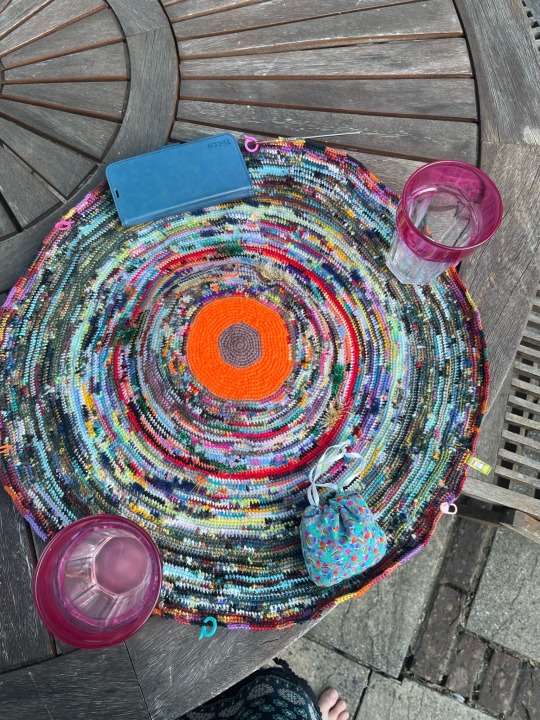
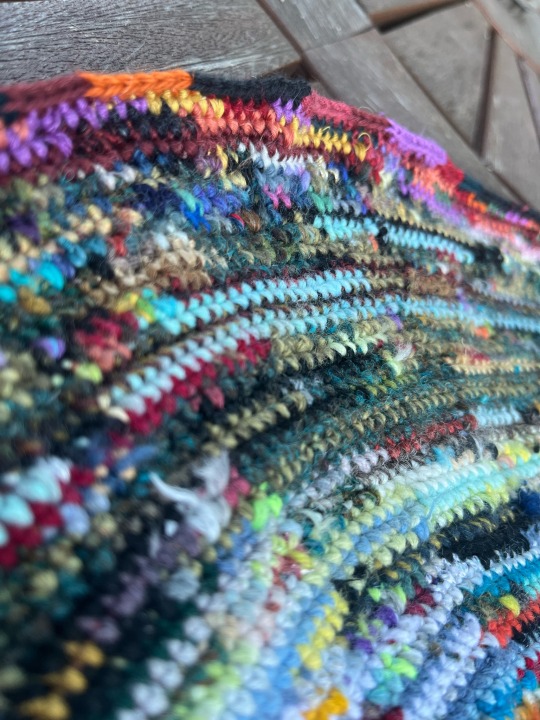

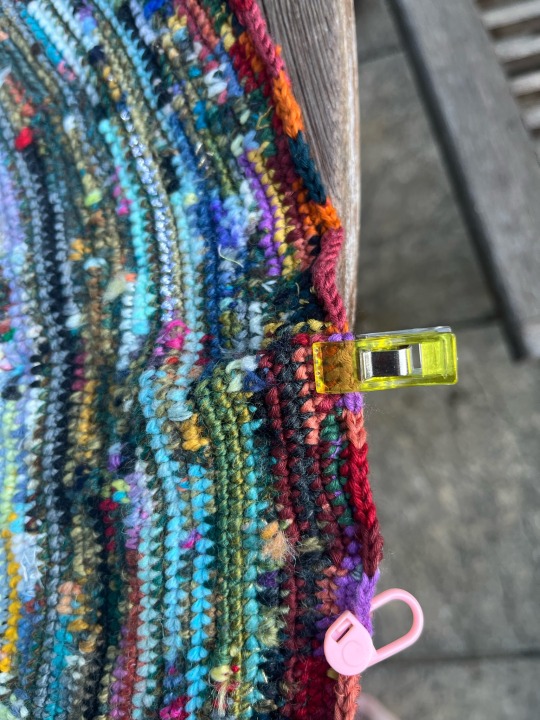
Brought the Eternal WIP/End of the Yarn Rug 2 out to play and she’s getting a decent size however The Math remains…. Not Mathing folks…. do I care all that much? Not really as we’re mostly ok except from the one bastard wrinkle which is just going to have to become a pleat next round. Hazards of winging it!
I do love how I can use this to chart all the things I’ve worked on in the past: here’s the leftovers from my colleague’s Halloween witch back when I worked in the fabric store, there’s the sparkly red leftovers from mountains of charity poppies, here’s the weaving frenzy that led to Too Many Scarves, there’s the last bits of tinsel yarn I was given as a gift that I’ve been using as Christmas twine (because I won’t sully myself with it anywhere else) all becoming one tapestry of the last four years of my life, still currently as tiny rug status.
She is becoming too big for her box though….
#cotton khaleesi#cottonkhaleesi#the eternal wip#the end of the yarn rug#multicoloured#crochet#reduce reuse recycle#endless circle#stashbuster#stash busting
10 notes
·
View notes
Text
For a costume concept of "a Loki Variant who crafted their outfit from scratch in the Void", I bought some pretty expensive yarn today ^^'.
Promise, the rest will all be thrifted materials XD.
#the convention is in march#but I'm lazy and it's an ambitious project#it's looks good so far#so much for the cheap costume XD#well#this yarn looks very good and it's made from a mix of organic cotton and recycled material#still expensive af for yarn#imagine making a whole sweater of this ????
3 notes
·
View notes
Text
Craft the best ethical clothing with Suvetah, your ethical clothing manufacturer! Sustainable fabrics, fair trade your partner in conscious fashion
#banana silk#french terry cotton#muga fabric#aloe fabric#yarn dyed fabric#natural dyes#bamboo fabric clothing#lotus silk price#woolen fabric#banana fiber clothes#myrobalan powder#bamboo knit fabric#pure wool fabric india#recycled cotton fabric manufacturers in india#clothes from banana fiber#sappan wood
1 note
·
View note
Text
#hemp textiles#organic corduroy fabric#natural dyed fabric#organic cotton fabrics#hemp cotton#muga silk fabric#silk fabrics#muga fabric#organic fabric#silk khadi fabric#organic cotton fabric#banana fabric#dyed fabrics#aloe vera fabric#hemp fabric#hemp fabrics#muga silk price#cotton knit fabric#natural dyed#lotus fabrics#fabric hemp#hemp fabric textiles#handloom khadi fabric#fabric recycles#hemp as fabric#yarn dyed fabrics#annatto powder#organic fabrics#khadi silk fabric#eri silk fabric
0 notes
Text
Swatching with the new Cotton Revive from Rowan Yarns
„Rowan Cotton Revive is a sustainable and environmentally conscious yarn. Crafted from regenerated cotton fibres, Cotton Revive offers an eco-friendly choice, great for both knit and crochet. Made from 80% recycled cotton and 20% other recycled fibres which are sourced from colourful textile scraps, fabrics and used clothes. A harmonious blend of style, comfort, and responsible manufacturing.“ [source: knitrowan.com]
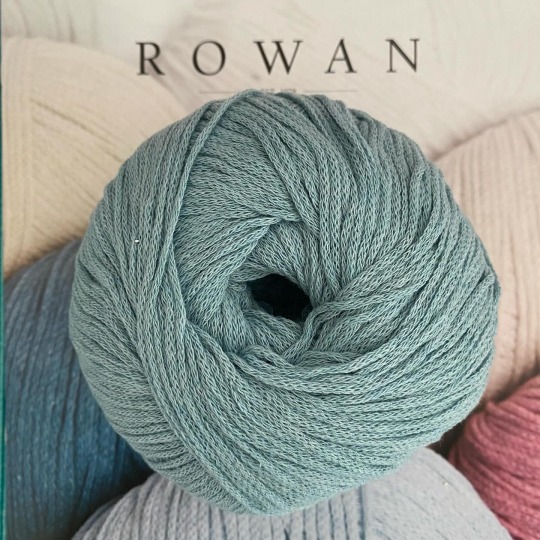
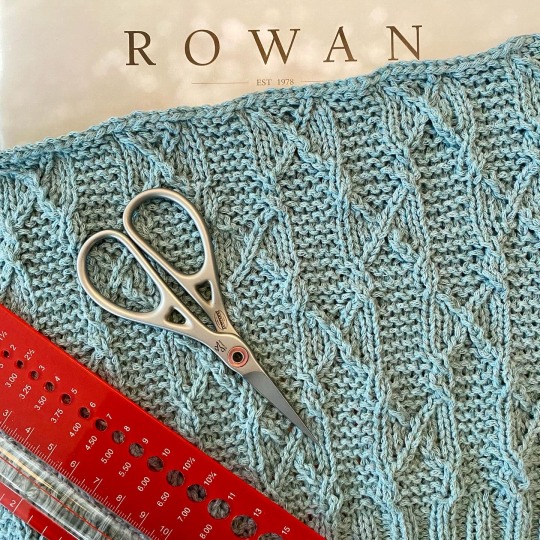
#rowan#rowan yarns#spring#knitting#cotton#cottonrevive#sustainability#sustainable#oekotex#recycling#recycled yarn
0 notes
Text
Discover our extensive regenerated yarn range - a testament to our commitment as leading recycled yarn manufacturers in India. Embrace eco-consciousness with recycled cotton yarn and dyed knitting yarn for sustainable fabric and garment creations. Join us in promoting a greener future!
#Regenerated Yarn Range#Recycled Yarn manufacturers in India#Recycled Cotton yarn manufacturers in India#Recycle Yarn Manufacturers#Regenerated Cotton Yarn#Dyed Knitting Yarn for Recycled Fabric and Garment
0 notes
Text

#cheapest place to buy yarn#cotton weaving yarn#best polyester yarn companies in india#cotton fiber yarn#recycled cotton yarn#buy weaving yarn online in india#buy sustainable yarn online in india#weaving yarn#fiber weaving products#best quality dyed yarns
0 notes
Text
Are you hunting for hand-dyed Merino wool yarns?
Contact the yarn hub if you want Hand-dyed Merino wool yarns. This gorgeous four-ply yarn is strong yet delicate. Beautiful for shawls and scarves and excellent for socks. Because they want to see how the colorways change as they work, customers prefer to knit, weave, and crochet with this yarn. It is enjoyable to apply and kind to the hands. This year's production was in Australia, where it was spun and colored, giving it a unique, remarkable quality. The dyes needed to produce distinctive colors are also produced in Australia. You support Australian producers and manufacturers by purchasing this product. For your textile research, YarnHub offers a selection of premium yarn. Our collection of hand-dyed, distinctive colors of YarnHub signature yarns will spark your creativity.
#cheap cotton yarn australia#25mm circular knitting needles#recycled cotton yarn australia#hand-dyed merino wool yarns
0 notes
Text

As the fashion industry becomes increasingly conscious of the need for sustainable apparel, know how the demand for recycled yarns is increasing?
0 notes
Text
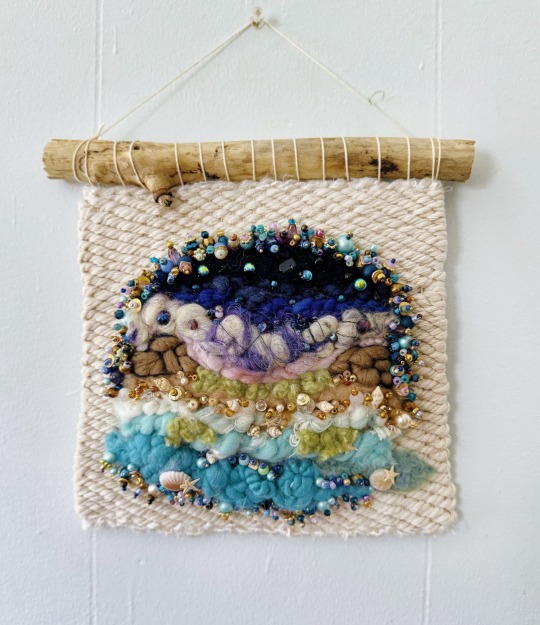


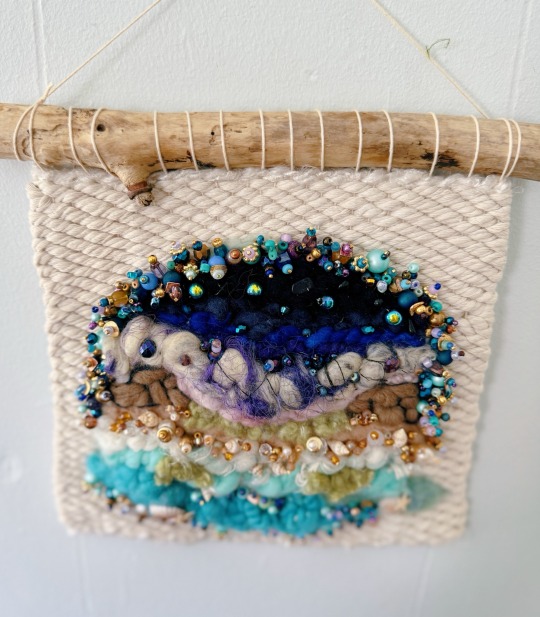

Beachy vibes 🏖️
Materials: wool, silk, recycled cotton rope. Includes handspun art yarn, beading sewn on.
#weaving#yarn#art#loom weaving#fiber#fiber arts#3d art#cottagecore#yarnweaving#crafts#beach#beach aesthetic#ocean#coast#sunset
177 notes
·
View notes
Text
where to get cheap FABRIC these days? assume I already understand the sources and options for items that can be turned into textiles like buying cheap drapes and thrifting, which are good suggestions. also btw if you do not already know, Indian textile importers go crazy on eBay rn. vintage or recycled sari silk (both fake silk and real mulberry silk) and woodblock cotton are both fantastic on eBay. but that's not what I need, rn I'm looking especially for velvet, silk velvet and rayon velvet particularly, in quantities large enough for bedding and drapes.
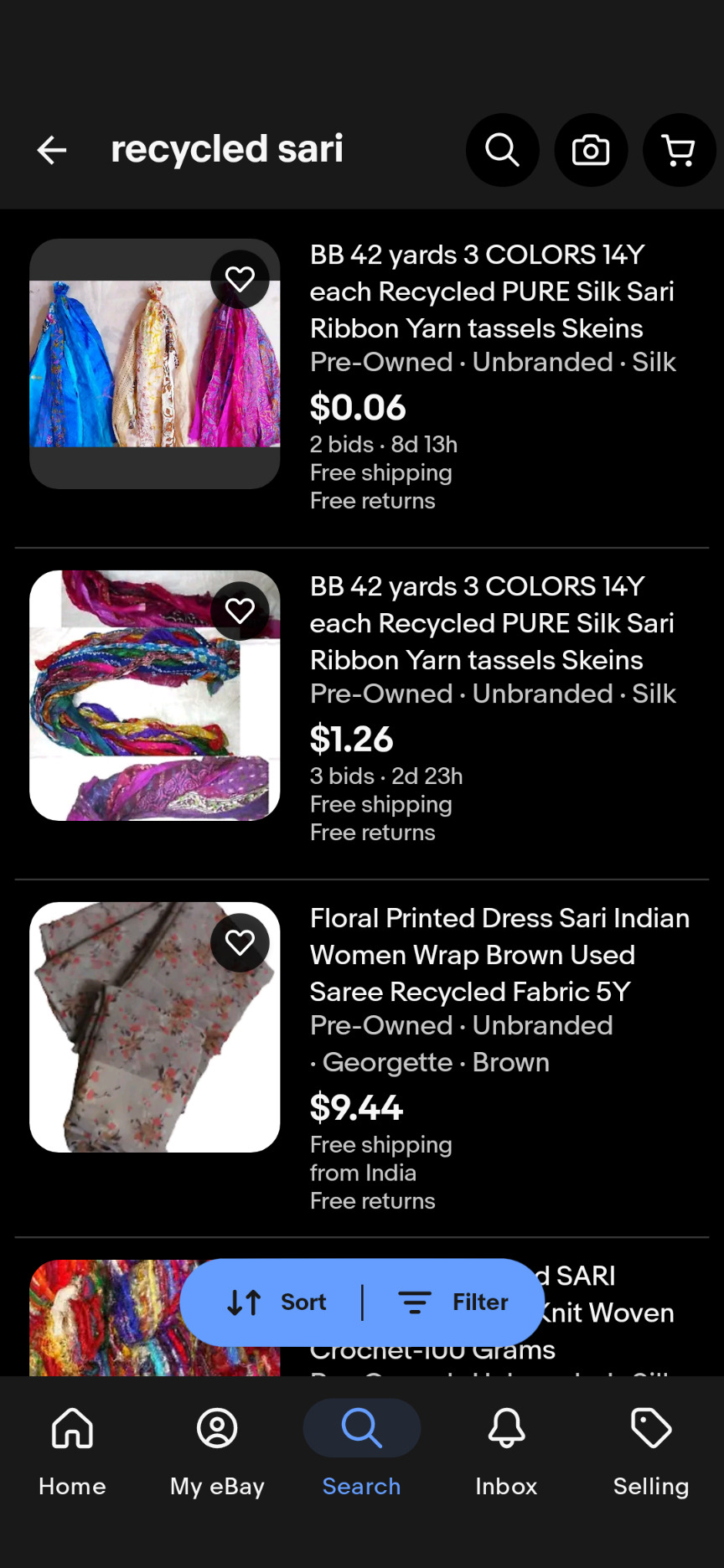
anyway here's some of the sari/saree that's available from India, I know a lot of my mutuals knit and crochet too, they have tons and tons of silk sari cut into yarn and ribbon too
105 notes
·
View notes